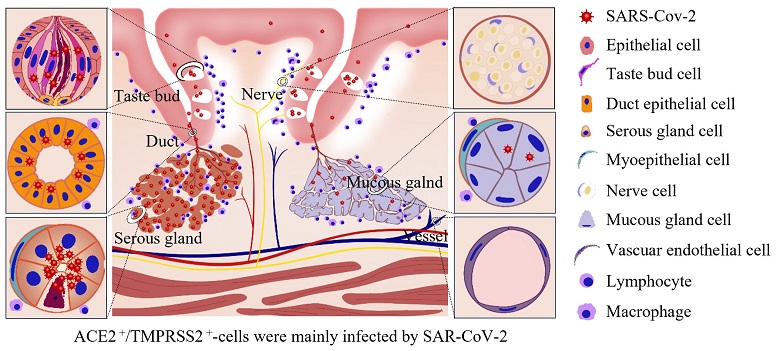Nikhil Prasad Fact checked by:Thailand Medical News Team Jun 24, 2024 1 year, 7 months, 3 weeks, 1 day, 5 hours, 9 minutes ago
COVID-19 News: The COVID-19 pandemic has been a global health crisis since its outbreak in late 2019. While the primary focus has been on respiratory symptoms, it has become evident that the virus causes a range of other issues, including the loss of taste, known as dysgeusia. This peculiar and often distressing symptom has prompted scientists to investigate its underlying causes. A recent study conducted in Wuhan, China that is covered in this
COVID-19 News report, has shed light on how SARS-CoV-2, the virus responsible for COVID-19, directly infects and damages tongue tissues, leading to taste dysfunction.
 Schematic of pathology and SARS-CoV-2 infection in the human tongue. SARS-CoV-2 primarily infected the KRT7+ taste receptor cells in taste buds, secretory cells in serous acini, and salivary gland duct epithelial cells. ACE2 and TMPRSS2 were both abundantly expressed in these cells. The infection caused inflammatory cell infiltration adjacent to the mucosa and around the salivary glands, pyknosis in the epithelia of the taste buds and salivary glands and mild edema in the superficial part of the lamina propria, especially adjacent to the taste buds.
Schematic of pathology and SARS-CoV-2 infection in the human tongue. SARS-CoV-2 primarily infected the KRT7+ taste receptor cells in taste buds, secretory cells in serous acini, and salivary gland duct epithelial cells. ACE2 and TMPRSS2 were both abundantly expressed in these cells. The infection caused inflammatory cell infiltration adjacent to the mucosa and around the salivary glands, pyknosis in the epithelia of the taste buds and salivary glands and mild edema in the superficial part of the lamina propria, especially adjacent to the taste buds.
The Study's Aim and Methodology
Researchers from the Tongji Medical College of Huazhong University of Science and Technology and the Wuhan Institute of Virology conducted an in-depth study on the tongues of five patients who died from COVID-19. The goal was to map out the pathology, distribution, and cell tropism (the cells that the virus infects) of SARS-CoV-2 in tongue tissues. This research aimed to provide a comprehensive understanding of how the virus affects taste by examining the tongue, a critical organ for taste sensation.
Detailed Findings
Inflammatory Response and Cell Death: All five patients' tongues showed moderate inflammatory cell infiltration, particularly around the salivary glands and in the superficial parts of the lamina propria, which is the connective tissue beneath the mucosa. There was noticeable cell death (pyknosis) in the epithelial cells of the mucosa, taste buds, and salivary glands. This widespread damage suggests that SARS-CoV-2 directly targets and harms these tissues, leading to dysgeusia.
-Infection of Taste Buds and Salivary Glands: The study found that SARS-CoV-2 primarily infects taste receptor cells within the taste buds and secretory cells in the serous acini of the salivary glands. These cells are rich in ACE2 and TMPRSS2 receptors, which the virus uses to enter and infect cells. The presence of the virus in these cells causes significant damage, disrupting taste sensation.
-Minimal Involvement of Nerves and Blood Vessels: Interestingly, the study revealed that SARS-CoV-2 and its receptors were rarely detected in the blood vessels and nerve fibers of the tongue. This finding indicates that while the virus severely impacts taste and salivary gland cells, it does not significantly affect the n
erves directly responsible for transmitting taste signals to the brain.
Implications of the Study
-Understanding Dysgeusia: Dysgeusia, or the loss of taste, is one of the most common symptoms of COVID-19. The infection and subsequent damage to taste receptor cells impair taste recognition, leading to weakened or lost taste sensation. This disruption can affect a person's appetite, nutrition, and overall quality of life. The inflammation around the taste buds further complicates the issue by disrupting the normal renewal cycle of taste bud cells, potentially prolonging the taste disorders.
-Impact on Salivary Glands: The infection of the salivary glands has significant implications. Salivary glands play a crucial role in maintaining oral health and facilitating taste by producing saliva. The virus's presence in these glands can reduce saliva production, leading to dry mouth (xerostomia), which further diminishes the ability to taste. Moreover, saliva containing the virus can spread the infection, highlighting the importance of understanding and managing oral health in COVID-19 patients.
-Broader Health Consequences: The taste dysfunction caused by COVID-19 can have broader health consequences. Impaired taste can lead to poor nutrition, weight loss, and diminished immune function. Additionally, the psychological impact of long-term taste loss can contribute to anxiety and depression, affecting overall well-being.
Conclusion
This groundbreaking study provides crucial insights into how SARS-CoV-2 directly infects and damages tongue tissues, leading to dysgeusia. By targeting specific cells in the tongue, the virus causes significant pathology, disrupting taste sensation and impacting overall health. These findings underscore the importance of monitoring and addressing oral health issues in COVID-19 patients to better manage and mitigate these symptoms. As we continue to learn more about the virus, such studies are vital in developing effective treatments and improving the quality of life for those affected by COVID-19.
The study findings were published in the peer reviewed journal: Frontiers in Cellular and Infection Microbiology.
https://www.frontiersin.org/articles/10.3389/fcimb.2024.1394721/full
For the latest
COVID-19 News, keep on logging to Thailand Medical News.
Read Also:
https://www.thailandmedical.news/news/european-society-of-cardiology-esc-showcases-new-study-that-shows-tongue-microbes-can-indicate-status-of-heart-health
https://www.thailandmedical.news/news/sleep-apnea-can-be-improved-by-losing-fat-in-the-tongue
